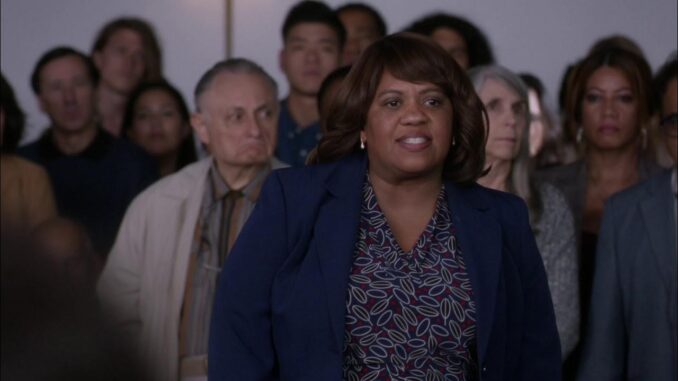
The sterile corridors of Grey Sloan Memorial Hospital have witnessed countless acts of heroism, heartbreak, and surgical miracles. Yet, amidst the spectacular saves and dramatic diagnoses, some of the most profound moments are born not from a scalpel, but from a fierce, quiet loyalty. For Dr. Miranda Bailey, the legendary "Nazi" turned Chief, her reputation was built on an unyielding adherence to rules, an almost dogmatic commitment to ethics, and a bedrock of professional integrity. But it was precisely when she threatened to shatter that bedrock, to compromise her very essence, that she revealed her boldest moment: protecting Meredith Grey when it mattered most.
From the outset, Bailey was the unwavering north star for her original cohort of interns. She was the one who barked orders, instilled discipline, and peeled back their youthful arrogance to reveal the nascent surgeons beneath. Meredith Grey, with her dark and twisty past, her inherent talent, and her knack for finding herself in the eye of every storm, was both a source of profound pride and exasperation for Bailey. Their relationship was forged in the fires of residency, a complex blend of mentor and mentee, surrogate mother and rebellious daughter. Bailey taught Meredith to cut, to diagnose, to lead; but more importantly, she taught her to be a doctor with a conscience, even if Meredith’s often led her down ethically questionable paths.
The crucible for Bailey’s ultimate act of protection arrived with the infamous Alzheimer’s clinical trial. Dr. Derek Shepherd, Meredith’s husband, was pioneering a groundbreaking study, and his dedication was absolute. Meredith, burdened by the ghosts of her own mother’s descent into Alzheimer’s and a profound empathy for the patients, watched with a growing sense of desperation as the trial progressed, particularly for Adele Webber, the wife of her beloved mentor, Richard Webber. Consumed by a desperate hope and a misguided sense of compassion, Meredith tampered with the trial, switching Adele's placebo medication with the active drug. It was a catastrophic breach of medical ethics, a felony that threatened to unravel careers, discredit an entire institution, and shatter the very trust upon which medicine is built.
When the truth inevitably surfaced, the hospital plunged into chaos. The ethical ramifications were staggering, the professional consequences potentially career-ending for Meredith. The medical board, the hospital administration, and the very foundation of scientific integrity demanded accountability. And then there was Miranda Bailey, the woman who had spent her entire career upholding the very rules Meredith had so brazenly broken. Her internal conflict must have been an inferno. Every fiber of her being, every principle she had ever championed, screamed for justice, for the book to be thrown at Meredith. Her eyes, usually so sharp and commanding, were clouded with a profound disappointment that bordered on betrayal. The Meredith she had nurtured, the surgeon she had believed in, had committed the unforgivable.
Yet, in that agonizing moment of choice, Bailey did not condemn. She did not cast the first stone, despite having every right and every ethical imperative to do so. Instead, she stood as a shield. It was not a grand, dramatic gesture, but a silent, unwavering defiance of her own ingrained principles. When the questions were pointed, when the accusations flew, Bailey’s silence was a roar. Her choice not to immediately expose Meredith, to allow Richard Webber to take the fall to protect his “daughter,” and then later, to quietly and stoically support Meredith through the repercussions, was an act of profound, almost illogical, love. It was a conscious decision to prioritize the flawed, brilliant woman she had helped shape over the rigid adherence to the letter of the law.
This was Bailey’s boldest moment because it was the most difficult. It required her to betray her own nature, to bend her unyielding moral compass, not for personal gain, but for the sake of another human being. It wasn't the bomb in the patient, or a massive trauma scenario where her surgical skills were paramount. It was a moral reckoning, a test of her capacity for grace, for forgiveness, and for a type of maternal protection that transcended professional boundaries. It revealed that beneath the "Nazi" facade lay a heart capable of profound empathy, a loyalty that superseded even her own stringent ethical code when it came to those she considered her own.
In the aftermath, Meredith faced her consequences, but she did so knowing that her sternest teacher, her harshest critic, had ultimately chosen to stand by her, even if silently, even if painfully. Bailey’s choice cemented their bond in a way that no shared surgery or triumphant diagnosis ever could. It was the moment Miranda Bailey transcended the role of chief and mentor to become something more profound: a steadfast guardian, illustrating that true leadership sometimes lies not in unwavering adherence to rules, but in the courage to make the agonizing, human choice to protect those you love, even when they've lost their way. It was a quiet act of defiance that spoke volumes about the depth of her character and the extraordinary heart that beat beneath her no-nonsense exterior.